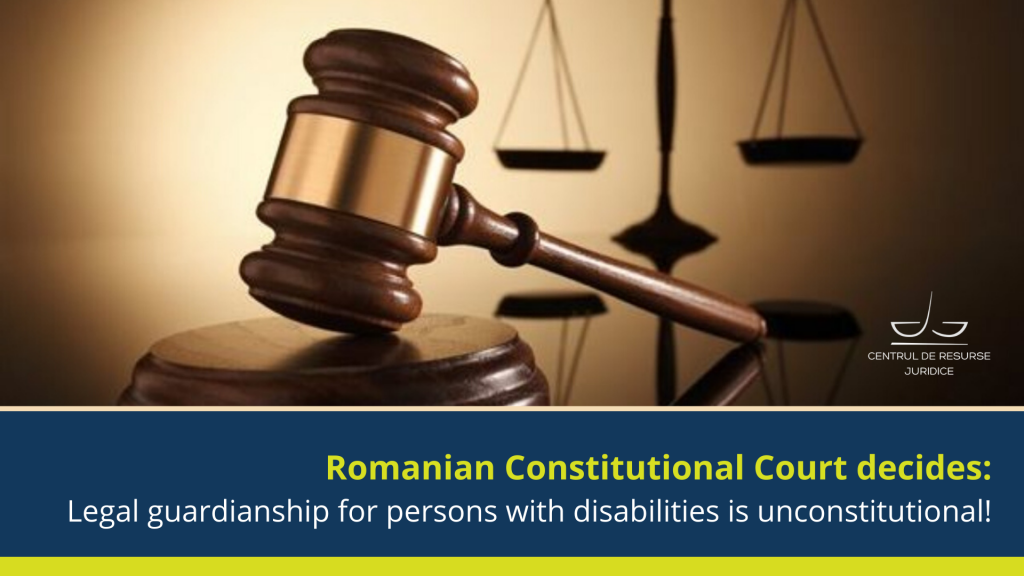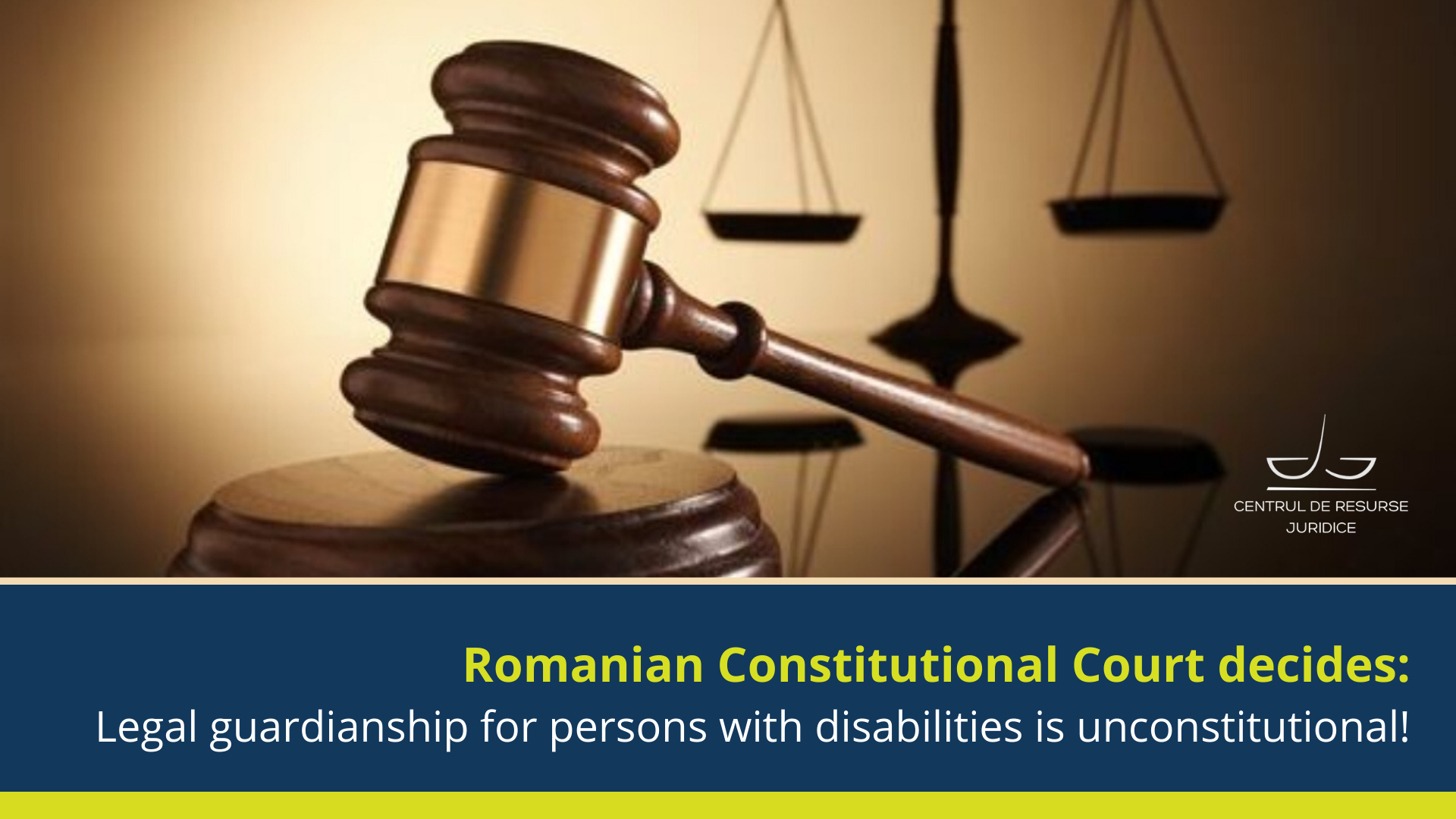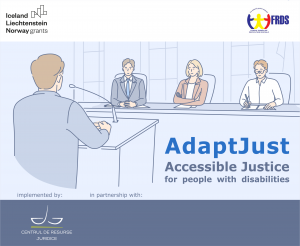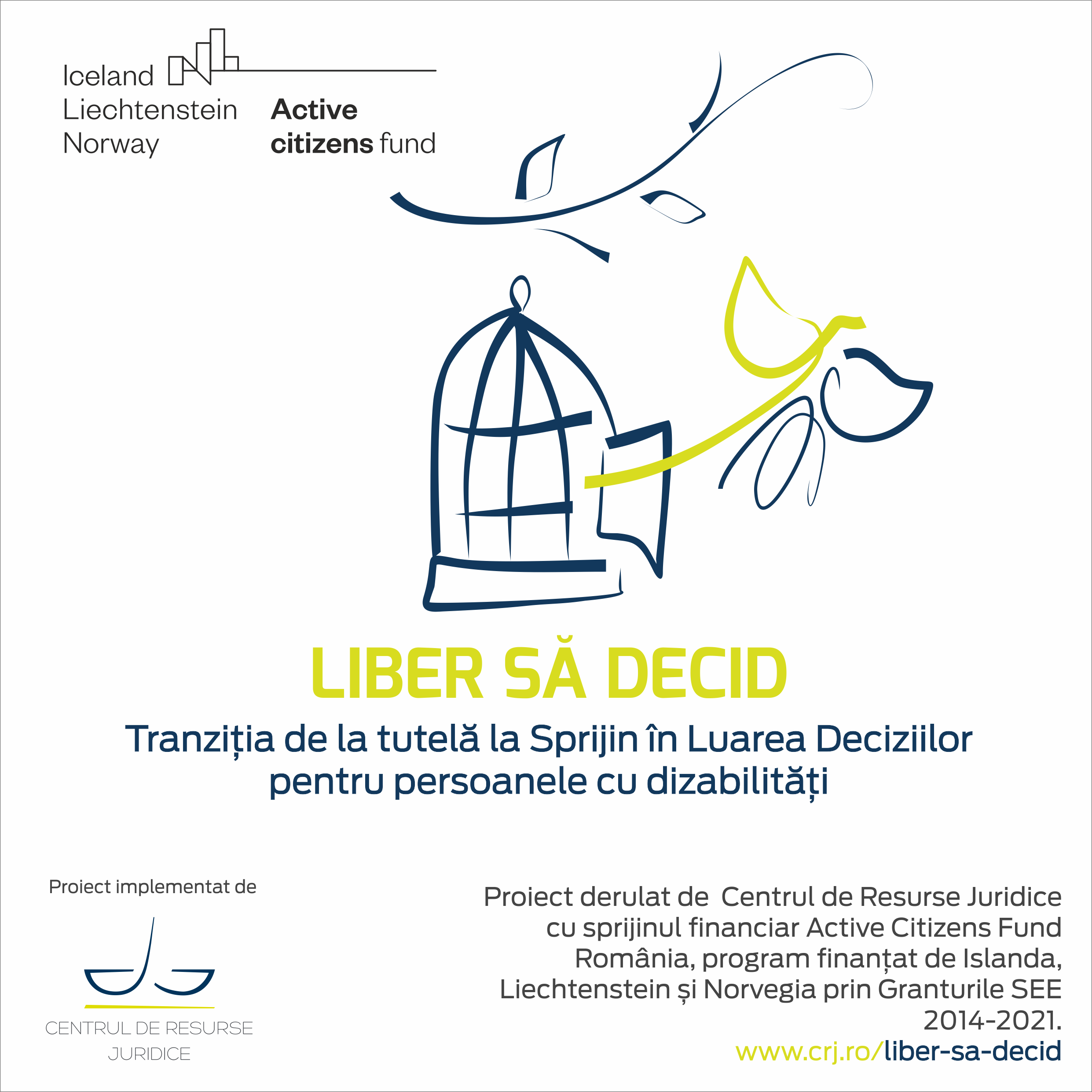Today, 16 July 2020, the Romanian Constitutional Court rendered, by unanimous consent, a historical decision[1] regarding the unconstitutionality exception of art.164 para.(1) of the Romanian Civil Code regarding legal guardianship of adult persons with disabilities. In this case, in 2017, CLR has lodged an Amicus Curiae[2] in support of the applicant, N.A., and in support of the unconstitutionality exception of art. 1641 of the Civil Code regarding legal guardianship, arguing that it “does not comply with the requirements of an international human rights treaty that Romania is a party to, […] being unconstitutional, because it is contrary to art. 11 para. (1) (Fulfilling in good faith obligations imposed by international treaties) as well as art. 20 (supremacy of international human rights treaties) of the Constitution.”
Article 164 para. 1 of the Romanian Civil Code reads as follows: The person who does not have the necessary discernment to take care of his own interests, due to alienation or mental disorder, will be placed under legal guardianship.
Essential elements of the Constitutional Court’s decision:
- The Court noted the breach of constitutional provisions of art.1 para. (3), art.16 and art.50, interpreted according to art. 20 of the Constitution, and through the perspective of art.12 of the UN Convention on the Rights of Persons with Disabilities.
- In motivating its ‘decision to allow the unconstitutionality exception, the Court noted, in essence, that the legal guardianship measure foreseen by art.164 para.(1) of the Civil Code is not accompanied by sufficient guarantees to ensure the respect of fundamental human rights and freedoms. It does not take into consideration the fact that multiple degrees of incapacity may exist, nor the diversity of interests that a person may have, it is not disposed for a limited period of time and it is not subject to periodical review.
- Any person must be free to act in view of developing his or her own personality, while the state, by virtue of its social character, has the obligation to create a normative framework that ensures the respect of the individual, the full expression of the personality of citizens, of their rights and freedoms, of equal opportunities, resulting in the respect of human dignity.
Romania is obliged to abolish legal guardianship of persons with disabilities since 2010, following the entry into force of Law no. 221/2010 for the ratification of the Convention on the Rights of Persons with Disabilities. Article 12 of the Convention on “Equal Recognition before the Law” provides that “persons with disabilities have the right to recognition everywhere as persons before the law.
Abolishing provisions on legal guardianship is recommended by the UN Committee on the Rights of Persons with Disabilities[3], the Committee of Ministers of the Council of Europe[4] and the Commissioner for Human Rights of the Council of Europe[5].
Among states in the region that have implemented art. 12 of the CRPD, abolishing legal guardianship provisions, are the Czech Republic, Latvia, Croatia and Georgia, while in Bulgaria a draft law on replacing legal guardianship with supported decision making services is pending in Parliament in view of adoption.
According to data collected by CLR, in Romania there are currently approx. 80 000 persons with disabilities under legal guardianship, out of which 3123 also live in institutions.
In the context of the supervision of the implementation of the ECHR judgement “CLR on behalf of Valentin Câmpeanu v. Romania[6]”, the Committee of Ministers of the Council of Europe stated that “under the current legal framework the only form of legal protection available for adults with mental disabilities fully deprives them of the exercise of their civil and political rights[7]”. As part of its efforts to implement this judgement, CLR organized, during 2019, several regional debates and an international conference on the subject “The process of supporting persons with psychosocial and intellectual disabilities in decision-making: replacing guardianship with assisted decision-making“[8], addressing legal guardianship from a human rights perspective and the right of adults with disabilities to act on an equal basis with others in all aspects of life.
In the meantime, in February 2020, the Bucharest District 1 Court vacated the guardianship measure of a young man, N.C., represented by CLR and supported in the community by ProAct Suport Association. The Court based its’ reasoning, in part, on the UNCRPD provisions, and found that the purpose of vacating the guardianship measure and of deinstitutionalisation is “ensuring independent living and inclusion into the community, inherent elements of the fundamental right to life and the right to respect for private life, proving that the guardianship is an interference that no longer corresponds to a pressing need in a democratic society”.
Given CLR’s expertise in the field and the government’s interest in contributing to the development of an appropriate regulatory framework, we express our readiness to collaborate in developing and piloting the new legal framework on supported decision-making services, in accordance with international human rights provisions.
Today’s Constitutional Court decision is a final argument for Romania’s urgent obligation to ensure equal recognition before the law of all persons with disabilities by also replacing their guardianship with supported decision-making services. This reform will restore the freedom of persons with disabilities to decide for themselves, with the potential to change the lives of tens of thousands of persons who are under legal guardianship or who risk being placed under legal guardianship. CLR awaits with interest the motivation of the Constitutional Court and congratulates lawyer Constantin Cojocariu, initiator of the request for examination of the constitutionality of Article 164§1 of the Civil Code regarding legal guardianship, as well as the other third party interveners.
For more information:
Georgiana Pascu, Program Manager, Centre for Legal Resources, gpascu@crj.ro, +40729881159
Ioana Iliescu, Project Coordinator, Centre for Legal Resources, ioana.iliescu@crj.ro, +40722442563
______________________________
[1] https://www.ccr.ro/comunicat-de-presa-16-iulie-2020/
[2] https://www.crj.ro/punea-sub-interdictie-a-persoanelor-cu-dizabilitati-pe-rolul-ccr/
[3] General comment No. 1 (2014) Article 12: Equal recognition before the law, 19 May 2014
Committee on the Rights of Persons with Disabilities, Eleventh session 31 March–11 April 2014
[4] Reccomendation CM/Rec(2011)14 of the Commitee of Ministers of the Council of Europe regarding the particpation of persons with disabilities in political and public life
[5] Who gets to decide? Right to legal capacity for persons with intellectual and psychosocial disabilities
Issue Paper published by the Council of Europe Commissioner for Human Rights, Council of Europe Publishing, April 2012
[6] http://hudoc.exec.coe.int/eng?i=004-13375
[7] Decision of the Committee of Ministers of the Council of Europe CM/Del/Dec(2018)1331/H46-21, available at http://hudoc.exec.coe.int/eng?i=004-13375
[8] https://www.crj.ro/invitatie-dezbatere-procesul-de-sprijinire-a-persoanelor-cu-dizabilitati-psihosociale-si-intelectuale-in-luarea-deciziilor-inlocuirea-tutelei-cu-decizia-asistata/







